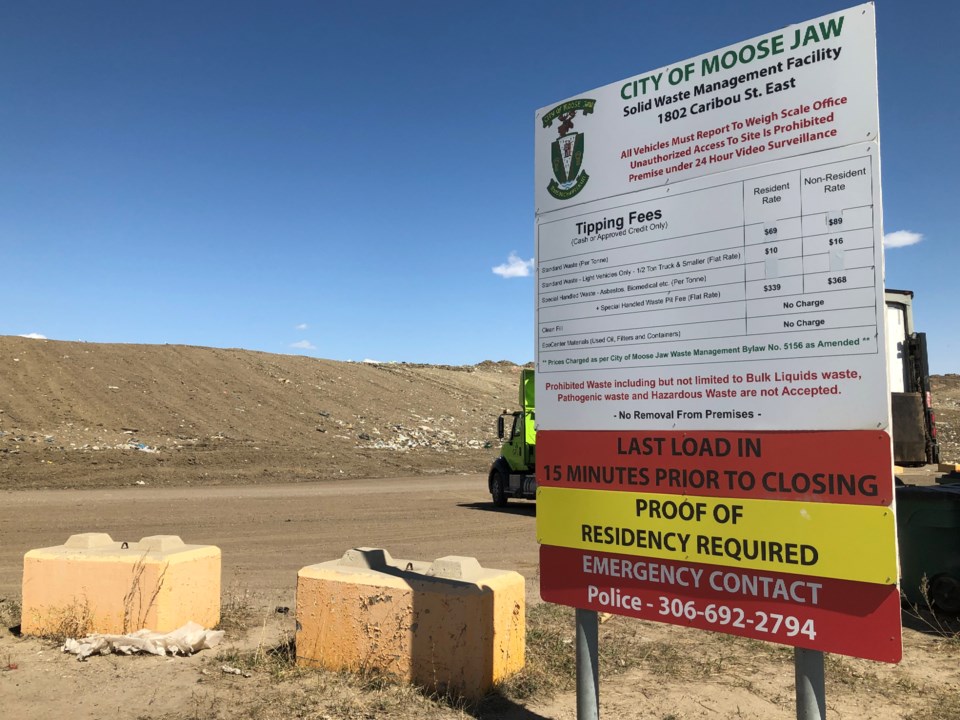MOOSE JAW — The closure of Moose Jaw’s landfill is expected to cost almost $8 million, which is why city council plans to pursue federal funding to assist with decommissioning the site.
During its June 27 regular meeting, council voted unanimously to support city administration’s application for an Investing in Canada Infrastructure Program (ICIP) grant for the landfill closure initiative, which has a budget of $7,723,950 excluding GST.
The funding sources include $5,663,973 through the expected ICIP grant and $2,059,977 from the municipality’s landfill closure and post-closure reserve accounts.
Furthermore, council agreed to meet all legislated standards, meet the terms and conditions of the ICIP program, conduct an open tendering process, manage the project’s construction, fund its share of the initiative, fund ongoing operation and maintenance costs, and follow any mitigation measures that the federal government requires.
Contractor supports closing landfill
City council hired Pinter & Associates Ltd. (P&A) in September 2021 to complete a decommissioning and reclamation plan (D&R), complete a feasibility assessment of alternative waste technologies for the existing landfill site, and complete and submit an ICIP application for the dump’s closure, Bevan Harlton, director of engineering, said during the meeting.
Pinter & Associates completed the D&R Plan in May, with its report recommending that the city close the landfill by 2026 for $6,716,479. This is a Class B cost estimate, with an expense range of plus-15 per cent, he continued. This cost reflects the high-end estimate of $7.7 million and represents the capital costs to close the 20.4-hectare (51-acre) site.
The contractor’s report also looked at alternative waste technologies to build on top of the existing site, Harlton said. The options included:
- A compost site for $1.85 million to $2.07 million and yearly operating costs of $280,000 to $330,000; this was not considered feasible because of site size constraints
- An anaerobic digestion system for $3.15 million to $3.5 million and yearly operating costs of $320,000 to $410,000; this was not considered feasible because of site size constraints
- An aeration system for $1.8 million and yearly operating costs of $290,000; this was not considered feasible because of the landfill’s remaining lifespan
- A waste to energy conversion system for $24.75 million and yearly operating costs of $5.03 million; this was not considered feasible because of cost
- A gas capture system for $4.64 million and yearly operating costs of $330,000; this was not considered feasible because the capital and operating costs outweighed the potential economic benefits of converting methane gas into energy
- A transfer station for $2.75 million to $5.85 million and an operating cost of $820,000 to $1.070 million; while this could work for Moose Jaw because of its size, it wasn’t recommended because the waste would go somewhere else and those costs would be passed to another community
- Expanding the landfill to the east; this was not considered feasible because that would be considered a new landfill and it’s unlikely the Ministry of Environment would provide the building permit, while there would be other provincial and federal regulatory requirements to meet
Coun. Heather Eby thought an interesting point was that the waste-to-energy conversion system — which sounded like a promising new technology — had enormous construction costs and was not something she would consider, even if residents urged her to support it.
“$24.75 million in capital costs is just not gonna happen,” she added.
Coun. Crystal Froese thought it was great that council was pursuing federal money for this project since it’s an essential “big-ticket item.” She also thought that in the future, the community would have to treat its new landfill differently than the current “old-fashioned dump style” and be more responsible with its waste.
The next regular council meeting is Monday, July 11.




